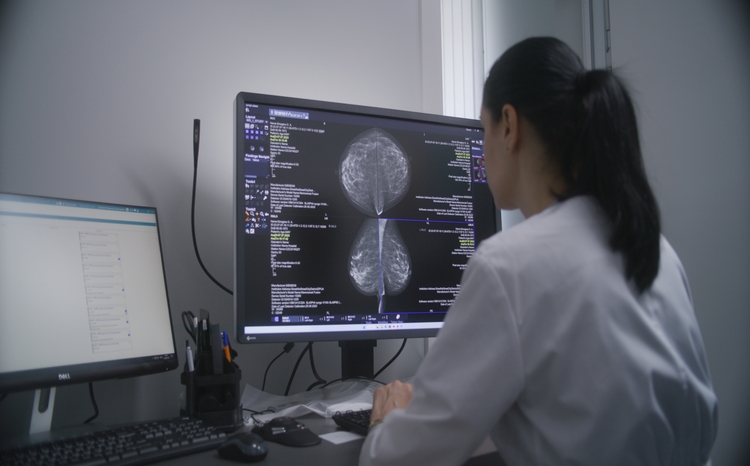Industry news in brief
- 4 March 2022

The latest Digital Health News industry round-up covers a new AI tool for covid-19 diagnostics, a call for a national strategy on the use of robotic assisted surgery and a digital integrated communications solution.
Verto 365 app approved by NHS Technical Design Authority
Work collaboration and project management app, Verto 365, has been approved by the NHS Technical Design Authority for use by NHS users. The approval means NHS staff can manage their day-to-day activities and projects from within MS Teams, as the app can be run entirely from within the programme.
Verto 365 is provided free-of-charge to all NHS organisations for their first three projects. It provides staff with management functionality such as Kanban boards, interactive Gantt charts, dynamic dashboards, planning and reporting.
The scalable platform provides flexibility and simplicity for organisations of all sizes and can be used from within MS Teams or from a browser. It promotes a more connected, collaborative and communicative way of working across teams.
Mid and South Essex Care Partnership goes live with Granicus
Mid and South Essex Care Partnership has gone live with an integrated communications solution from Granicus. The platform will help the organisation to deliver its e-marketing campaigns to staff, stakeholders, partners and residents.
The govDelivery platform will also support the communication of upcoming changes, as Mid and South Essex prepares to become an Integrated Care System from July 2022.
James Sharp, digital media and marketing manager at Mid and South Essex Health and Care Partnership, said, “We were drawn to the Granicus govDelivery platform because it’s tailored for the public sector, along with the analytics and the results it provides.
“We find its functionality is much more pointed towards our needs as an organisation. We wanted to engage with a wider demographic amongst our residents by offering them a choice of how they wanted to be communicated with; whether that’s by email, website or mobile notification.
“We are also seeing some excellent results from our winter campaign powered through Granicus’ platform and we haven’t seen a significant number of unsubscribes from the campaign. Users are signing up and staying subscribed for the whole series.”
ABHI Robotic Assisted Surgery white paper sets out case for national strategy
The Association of British HealthTech Industries (ABHI), the UK’s leading industry association for health technology, has published a white paper, ‘Robotic Assisted-Surgery and New Models of Surgical Care’, which sets out the case for a national multi-stakeholder strategy for robotic assisted surgery to support a wider roll out across the NHS.
The paper explores the common themes and challenges for healthcare providers, clinicians and the industry in supporting the adoption of robotic assisted surgery. It also makes a series of recommendations spanning regulation, policy, evidence, awareness and training.
Andrew Davies, digital health lead, ABHI said: “The benefits of Robotic-Assisted Surgery are well rehearsed, but collaboration will be key to realising them, and through the ABHI group we will be using the paper as an engagement tool to inform future work and partnering opportunities.”
The project has been spearheaded by ABHI’s Robotic Assisted Surgery Group. It brings together health tech companies, the clinical community and other relevant organisations who have a strong interest in furthering the development of surgical robotic systems.
HCI launches ophthalmology patient video series
HCI has worked with NHS England and NHS Improvement to produce a series of ophthalmology information videos. The videos support the ambitions of the National Outpatient Transformation and Pathway Improvement Programmes, and will help an estimated two million people living with sight conditions.
HCI worked on the series in collaboration with The Royal College of Ophthalmologists, Moorfields Eye Hospital, Torbay and South Devon NHS Ophthalmology Department, and a number of UK charities.
Mel Hingorani, National Eye Care Recovery and Transformation Programme co-clinical lead, NHS England and Improvement, said: “The Outpatient Transformation Programme is supporting implementation of new initiatives and digital solutions that will help to ensure services continue to meet the needs of all our patients. These videos provide accessible, quality-assured information for patients and can shorten or replace information-giving appointments, helping to free up clinical time which in turn supports the recovery of hospital services.”
There are currently 28 patient-facing videos which will support patients in understanding risk, consent, options for treatment and self-care. They are available on HCI’s National Health and Care Video Library, which is available for those working in primary, acute and community care as well as high street ophthalmologists and sight charities to share with their patients.
HCI’s next phase includes its multiple conditions app, CONNECTPlus, be used as a testbed for an enhanced delivery programme of support, including the videos, health tracking, medication and appointment management tools.
iCAIRD study explores AI imaging for covid-19 diagnosis
A study conducted by iCAIRD, Scotland’s Industrial Centre for AI Research in Digital Diagnostics, has found promising results in the use of AI imaging in chest x-rays to speed up covid-19 diagnosis.
The three-minute chest x-ray uses a new AI algorithm whose performance was on par with four certified radiologists. It used Canon Medical Research Europe’s Safe Haven Artificial Intelligence Platform (SHAIP) as well as datasets from the Glasgow Safe Haven.
Prof David Lowe, joint clinical lead of the West of Scotland Innovation Hub and an emergency medicine consultant at Queen Elizabeth University Hospital, said: “This is another welcome development demonstrating the potential for AI to support clinicians ensuring patients are getting the highest quality and most relevant treatment.
“Through testing in a safe environment we have been able to see that this algorithm can identify Covid-19 on Chest X-rays that were routinely taken during initial clinical assessment. This could not just help with the treatment of patients but may also speed up the process of isolating infected patients.”
The study was funded by Innovate UK and was ran in partnership with NHS Greater Glasgow and Clyde.
Hospitals increase capacity through AI
Clinical trials across multiple NHS trusts have show promising results in the use of an AI decision support model that is helping to safely and accurately prioritise patients and increase capacity to tackle the national elective backlog.
The Cheshire and Merseryside model, which was pioneered by St Helens and Knowsley Teaching Hospitals NHS Trust, uses a system that allows surgeons to more accurately prioritise patients according to their specific clinical risk and impact of treatment delays.
The system was created by healthcare analytics and AI company C2-Ai and uses robotic process automation to build on a prioritisation model from the Royal College of Surgeons.
It uses hospital data to stratify elective surgical waiting lists, based on individuals’ mortality and morbidity risk, the risk of increasing complexity as well as other factors.
Three trusts in Cheshire and Merseyside – St Helens and Knowsley Teaching Hospitals NHS Trust, Warrington and Halton Teaching Hospitals NHS Foundation Trust and Liverpool University Hospitals NHS Foundation Trust – applied the model, commissioned by NHS England and Improvement, to a cohort of 125,000 patients.
The trusts saw more than an eight per cent reduction in emergency admissions from patients on waiting lists; 125 bed-days saved per 1,000 patients on the list due to reduced avoidable harm, a 30 per cent reduction in surgeon time spent on triage, and faster clearing of the elective waiting list backlog.
In addition there was a reduction in deterioration of patients, reduced burnout for surgeons and better use of independent sector hospitals treating NHS patients.





